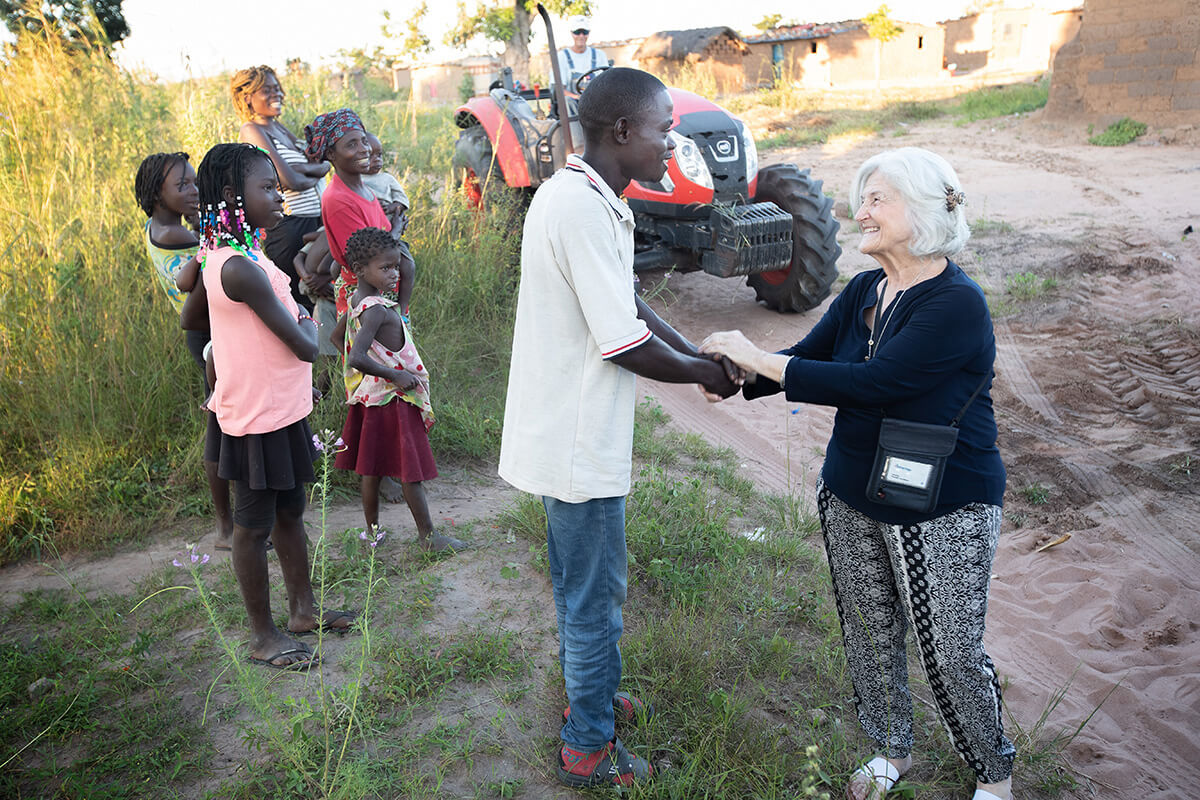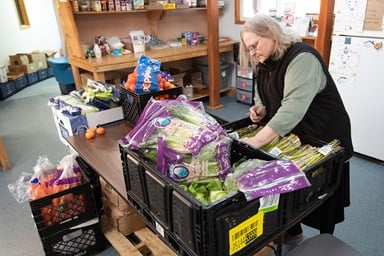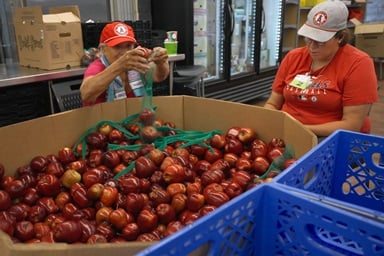Key points:
- United Methodists are planning a long future for short-term missions even as the post-disaffiliation denomination grapples with tighter budgets.
- United Methodist Volunteers in Mission leaders across the U.S. gathered near Chicago to learn more about VIM, Inc., which allows greater mission collaboration across institutional lines.
- Those gathered also discussed goals that include training more young adult volunteer team leaders and working more closely with Methodist ecumenical partners.
The Rev. Adlene Kufarimai grew up excited to see how United Methodist mission work improved health care and education in her native Zimbabwe. Now, she has brought that same zeal for short-term missions to her ministry in the United States.
“Mission is a key part to discipleship because it’s not a structure or a system; it’s the church on the move,” said Kufarimai, who is now the North Alabama Conference’s director of connectional ministries.
“It’s the church being in partnership with God to do God’s work,” she said. “When people see that, they say, ‘I want to be part of this church.’”
Kufarimai was among about 90 clergy and lay people from across the U.S. who gathered Sept. 2-3 to discuss how United Methodist Volunteers in Mission can ensure churchgoers engage in disciple-making mission work far into the future.
The UMVIM Connect meeting — hosted for free by the denomination’s retirement-benefits agency Wespath at its offices outside Chicago — came as The United Methodist Church rebuilds after a season of infighting and church disaffiliations.
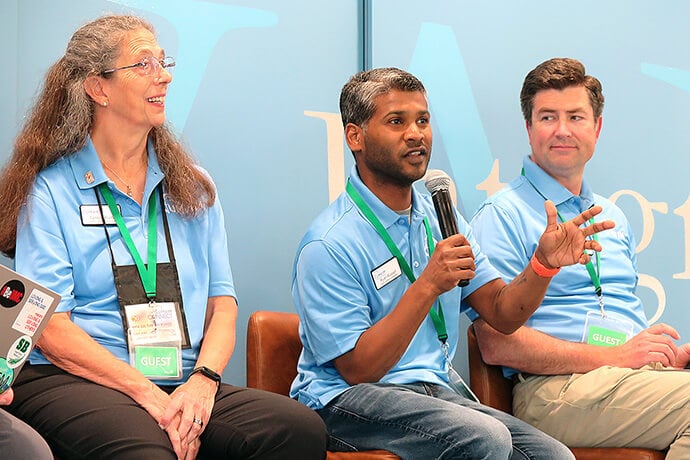
Even as they grapple with tighter church budgets and gaps created by the Trump administration’s dismantling of U.S. foreign aid and emergency relief, the Volunteers in Mission leaders see their work as more crucial than ever and key to living out and spreading the Gospel.
“Our work is not to get people to heaven. That’s God’s work. By the way, God’s already done that work,” the Rev. Jeremy Basset, the Horizon Texas Conference’s disaster response coordinator, preached during the gathering’s opening devotion.
What regionalization means for mission
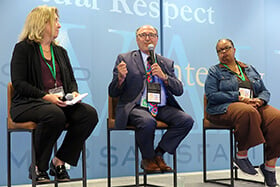
Three United Methodist bishops discussed what regionalization would mean for the denomination’s global mission work if ratified.
“Our work is to invite people into enjoying the kingdom of heaven come to earth, here and now, and to know and claim their salvation that Christ bought for them on the cross. Our work is to make this place where we live look more and more like heaven every single day.”
As Kufarimai sees it, Volunteers in Mission are evangelists. “I’ve seen people start joining church, be baptized and change their life because they’ve seen the church on the move,” she said.
United Methodist Volunteers in Mission, better known as UMVIM, is a grassroots movement that since starting in the Southeastern Jurisdiction in the 1970s has provided an organized way for U.S. United Methodists to join in short-term missions locally, nationally and globally. UMVIM provides training for team leaders, insurance for mission teams, a list of vetted projects to join and other resources. The goal is to put “Christian love into action.”
Put another way, even before the adoption of The United Methodist Church's new vision statement, Volunteers in Mission were striving to "love boldly, serve joyfully and lead courageously."
Since the 1980s, many U.S. United Methodist conferences have put a Volunteers in Mission coordinator on staff. Often, it’s the same person who works as the conference’s disaster response coordinator. The five U.S. jurisdictions, which all encompass multiple conferences, also each have their own Volunteers in Mission boards as well as a coordinator on staff.
All these leaders, including the teams they organize, work closely with the United Methodist Board of Global Ministries, the denomination’s mission agency. Global Ministries helped sponsor the UMVIM Connect meeting.
Today, UMVIM-trained teams provide medical and dental care, building and home repairs, church camp cleanup, agricultural training and vacation Bible schools — often in partnership with full-time United Methodist missionaries. UMVIM also includes the NOMADS, which stands for Nomads On a Mission Active in Divine Service or more informally known as “Nice Old Methodists Avoiding Deep Snow.” These are retirees who travel around the U.S. in RVs and converge on various ministry sites.
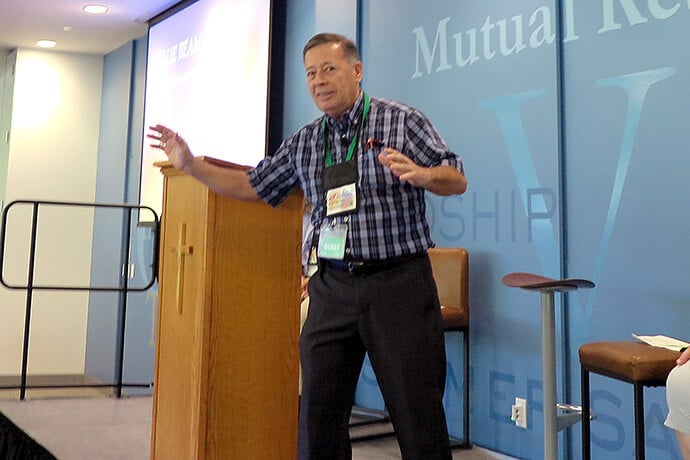
But perhaps the impact of Volunteers in Mission is most visible during long-term disaster-recovery work.
The United Methodist Committee on Relief — the denomination’s well-known humanitarian arm that’s part of Global Ministries — distributes relief supplies, awards grants and trains the early response teams who serve initial needs after disaster strikes. However, UMCOR counts on Volunteers in Mission to keep providing help long after a disaster has left the headlines.
“We leverage UMVIM teams to do the work of recovery in communities all over, and this spans the entirety of a disaster recovery, which could be years,” Katie Hills, UMCOR’s director of disaster response, told United Methodist News. For example, the church Volunteers in Mission teams played a critical role in the decade-long recovery after Hurricane Katrina.
With so much at stake, Volunteers in Mission leaders across the U.S. began taking action in 2019 to ensure the ministry would continue even as other denominational leaders began planning for The United Methodist Church to separate along theological lines. The result was to create VIM, Inc., overseen by a single board with representation from all five jurisdictions as well as Global Ministries, to help ease cooperation no matter what the denomination’s future held.
With the COVID shutdowns, a history-making General Conference and church departures now in the rear view, the UMVIM Connect event marked the public debut for VIM, Inc., for many church leaders.
The gathering was also the first time that members of all five jurisdictional boards as well as other conference leaders had ever met to dream together about next steps. Four U.S. bishops — Bishops Dan Schwerin, David Bard, Kristin Stoneking and Robin Dease — also joined in the discussion.
Before VIM, Inc., came together, the Volunteers in Mission jurisdictional coordinators tended to operate in silos and duplicate efforts.
That’s now changed. Among other ways of simplifying the work, the Volunteers in Mission now share a single website that offers a one-stop shop for insurance, a database of mission projects and a more centralized way to access training opportunities including online.
“Coming together and planning and determining how can we best collaborate on this work not only saves us money, but also time and effort to do these things,’ said the Rev. Matt Lacey, the Southeastern Jurisdiction’s coordinator.
“And I will say this, I’ve been doing this for almost eight years. I have never felt more supported. … More often than not, just like the United Methodist connectional system, we are working together better than the sum of our individual parts.”
The jurisdictional coordinators now also have shared goals including training 100 young-adult team leaders in the coming year and developing a larger network of projects and connections around the globe.
That includes with ecumenical partners like the Methodist Church of Mexico, which is developing its own Volunteers in Mission program.
Willie Berman, director of Manos Juntas Mexico (Hands Together Mexico) that works with U.S. Volunteers in Mission, urged United Methodists not to foster dependency.
Subscribe to our
e-newsletter
“I used to tell the construction teams: ‘Don’t take your hammer back with you. Leave your tools with us so we can do the work,’” he said. “And I think your mission teams, they need to be very intentional about that. Make a note. Write it down. When you go somewhere else, you need to empower people, and you need to provide them the tools so they can continue the work.”
The gathering took as its theme the Bible passage Micah 6:6-8, which states that God requires worshippers to do justice, love kindness and walk humbly with God.
The Rev. Tammy Kuntz, the North Central Jurisdiction coordinator, reminded those gathered why they do this work in the first place.
“The mission journey is so much more than a mission trip,” she said. “It is part of our faith journey. We serve, learn, grow and come home to share the mission story as we feed the hungry, quench the thirsty soul, clothe the naked, visit the sick and imprisoned, provide comfort for someone in need, and so much more.”
The Rev. Ryan Russell, an elder in the Iowa Conference and chair of the VIM, Inc., board, said this unprecedented gathering of UMVIM leaders from across the U.S. created new connections and new understandings of how to do this work.
One emphasis of organizers throughout the event was that everyone — no matter their economic status, age, race, ability, gender or sexual orientation — can be engaged in mission. UMVIM, for the first time in its history, in July was a sponsor of the Reconciling Ministries Network Convocation, an event that supports LGBTQ inclusion in church life.
Russell sees every reason to be hopeful that Volunteers in Mission will continue to make disciples for years to come.
“I’m excited for the future of where this ministry will be headed as we continue to figure out how we fit in the new direction of the church,” he said.
Kufarimai of the North Alabama Conference summed up mission’s enduring impact.
“If church was just within the walls, probably I would not be here doing what I’m doing. But I love that God is calling us to be in action.”
Hahn is assistant news editor for UM News. Contact her at (615) 742-5470 or [email protected]. To read more United Methodist news, subscribe to the free UM News Digest.

